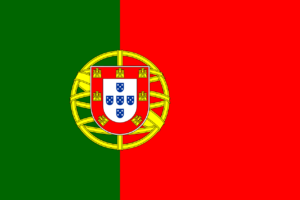⤷ You are here:
🖖︎ Prayers & Praxes —⟶ 🌍︎ Collective Welfare —⟶ Sovereign States & Meta-national Organizations —⟶ 🇵🇹 Portugal 🡄 (Previous category) :: 📁 🇵🇱 Poland 📁 🇷🇴 Romania :: (Next Category) 🡆 Sorted Chronologically (old to new). Sort most recent first? This is the Hanoten Teshua formula of the Prayer for the Wellbeing of the Government as translated by Artur Carlos de Barros Basto in Portuguese on page 34 of his Shabbat morning prayer-pamphlet Oração Matinal de Shabbath (1939). I have set Barros Basto’s Portuguese translation side-by-side with the Hebrew text of Hanoten Teshua (the variation of the prayer corresponding to Barros Basto’s translation). . . . Categories: Tags: Contributor(s):
Stable Link:
https://opensiddur.org/index.php?cat=6129
Associated Image: 
Flag of Portugal, created by Columbano Bordalo Pinheiro (1857–1929), officially adopted by Portuguese government in June 30th 1911 (in use since about November 1910). (1911-) (This image is set to automatically show as the "featured image" in shared links on social media.)
Terms of Use:
Be a mentsch (a conscientious, considerate person) and adhere to the following guidelines:
Additional Notes:
Support this work:
The Open Siddur Project is a volunteer-driven, non-profit, non-commercial, non-denominational, non-prescriptive, gratis & libre Open Access archive of contemplative praxes, liturgical readings, and Jewish prayer literature (historic and contemporary, familiar and obscure) composed in every era, region, and language Jews have ever prayed. Our goal is to provide a platform for sharing open-source resources, tools, and content for individuals and communities crafting their own prayerbook (siddur). Through this we hope to empower personal autonomy, preserve customs, and foster creativity in religious culture.
ויהי נעם אדני אלהינו עלינו ומעשה ידינו כוננה עלינו ומעשה ידינו כוננהו "May the pleasantness of אדֹני our elo’ah be upon us; may our handiwork be established for us — our handiwork, may it be established." –Psalms 90:17
| ||
Sign up for a summary of new resources shared by contributors each week
  |
